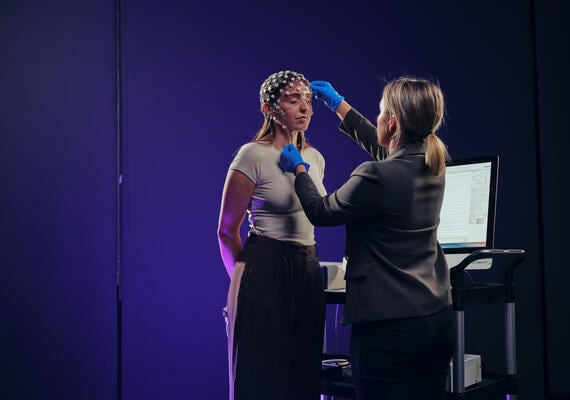
Our research areas
Our researchers work across a diverse range of research areas in cognitive neuroscience. They use cutting-edge equipment to work on flagship projects across several key laboratories.
The Cognitive Neuroscience Unit (CNU) examines both non-clinical and clinical populations to better understand a range of conditions, including autism spectrum disorder, language impairment, traumatic brain injury and developmental coordination disorder. Through various clinical trials, the CNU also aims to develop novel interventions that use current neuroscience approaches and understandings.

Our researchers work across a diverse range of research areas in cognitive neuroscience. They use cutting-edge equipment to work on flagship projects across several key laboratories.
The Brain and Cognitive Development Lab uses advanced neuroimaging techniques to enhance our understanding of neurodevelopment and how brain maturation relates to the development of cognitive functions. We use a range of Magnetic Resonance Imaging (MRI) techniques (including structural, diffusion weighted imaging, functional and resting state) to investigate brain development in typical childhood, as well as when neurodevelopment goes awry, such as neurodevelopment disorders.
Our flagship projects include:
The Brain Systems and Neurotherapeutics Lab uses advanced neuroscience techniques to better understand brain activity underlying neurodevelopmental, psychiatric and neurological disorders, such as autism, schizophrenia and dystonia. Our researchers use this knowledge to develop novel therapies that can target these brain systems and improve outcomes for individuals and their families.
Our flagship projects include:
Study a research degree or PhD with Deakin’s Faculty of Health and take a closer look at human behaviours, personalities, mental states, the brain and its processes.
The Electroencephalography (EEG) and Cognitive Dynamics Laboratory uses EEG to investigate the neural dynamics that underpin cognition, language, memory, motor functioning and human performance. The primary objective of our research is to investigate how communication between millions of neurons in the brain enables us to learn and complete everyday tasks.
Our flagship projects include:
The Neuromotor Development Lab conducts a series of world-first studies investigating the causal mechanisms that subserve individual differences in skill acquisition across development and in neurodevelopmental disorders, such as Developmental Coordination Disorder (DCD) and ADHD.
Our flagship projects include:
The Neuroplasticity and Multimodal Imaging (NMI) Lab seeks to gain a deep understanding of how the brain changes in response to training in patients with brain injury, including detailed identification of damage to brain tissue resulting from injury. The lab also investigates the effect of training programs at the level of brain macrostructure and microstructure (neuroplasticity), which includes detailed spatio-temporal profiling of associated changes.
Our flagship projects include:
From groundbreaking transcranial magnetic stimulation to eye tracking and neuronavigation, our facilities will help you further your understanding of the human body and mind.
Associate Professor Christian Hyde is the co-leader of the CNU and lab leader of the Neuromotor Development Lab.
Associate Professor Jarrad Lum is the co-leader of the CNU and the lab leader of the EEG and Cognitive Dynamics Lab.
Professor Karen Caeyenberghs is the lab leader of the Neuroplasticity and Multimodal Imaging Lab.
Dr Talitha Ford is a Research Fellow in the School of Psychology and one of the lab leaders of the Brain Systems and Neurotherapeutics Lab.
Dr Aron Hill is a Senior Research Fellow in the School of Psychology and one of the lab leaders of the Brain Systems and Neurotherapeutics Lab.
Professor Tim Silk is the lab leader of the Brain and Cognitive Development Lab.
Our team is here to answer your questions and help you learn more about the CNU.
Twitter/X: @DeakinCNU